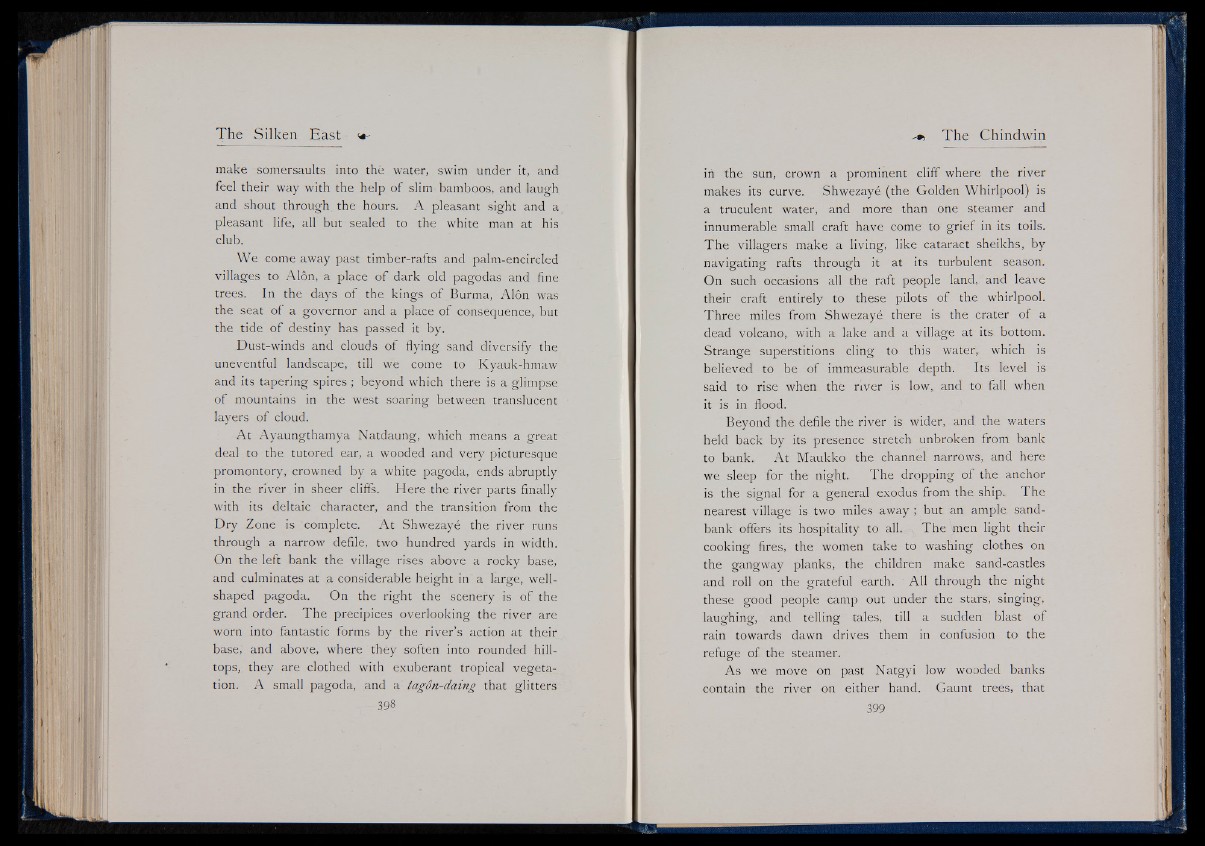
make somersaults into thè water, swim under it, and
feel their way with the help of slim- bamboos, and laugh
and shout through the hours. A pleasant sight and a
pleasant life, all but sealed to the white man at his
club.
We come away past timber-rafts and palm-encircled
villages to Alón, a place of dark old pagodas and fine
trees. In the days of the kings of Burma, Alón Was
the seat of a governor and a place of consequence, but
the tide of destiny has passed it by.
Dust-winds and clouds of flying sand diversify the
uneventful landscape, till we come to Kyauk-hmaw
and its tapering spires ; beyond which there is a glimpse
of mountains in the west soaring between translucent
layers of cloud.
At Ayaungthamya Natdaung, which means a great
deal to the tutored ear, a wooded and very picturesque
promontory, crowned by a white pagoda, ends abruptly
in the river in sheer cliffs. Here the river parts finally
with its deltaic character, and the transition from the
Dry Zone is complete. At Shwezayé the river runs
through a narrow defile, two hundred yards in wfldth.
On the left bank the village rises above a rocky bas§j¡
and culminates at a considerable height in a large, wellshaped
pagoda. On the right the scenery is of the
grand order. The precipices overlooking the river are
worn into fantastic forms by the river’s action at their
báse, and above, where they soften into rounded hilltops,
they are clothed with exuberant tropical vegetation.
A small pagoda, and a tagon-daing that glitters
in the sun, crown a prominent cliff where the river
makes its curve. Shwezayd (the Golden Whirlpool) is
a truculent water, and more than one steamer and
innumerable small craft have come to grief in its toils.
The villagers make a living, like cataract sheikhs, by
navigating rafts through it at its turbulent season.
On such occasions all the raft people land,’and leave
their craft entirely to these pilots of the whirlpool.
Three miles from Shwezaye there is the crater of a
dead volcano, with a; lake and a village at its bottom.
Strange: superstitions cling to this water, which is
believed to be of immeasurable} depth. Its level is
said to rise when the river is low,, and to fall when
it is in flood.
Beyond the; defile the river is wider,, and the waters
held back by its presence stretch unbroken from bank
to bank. At Maukko the channeb narrows, and here
we sleep for the night. The dropping of the anchor
is the signal for a general exodus from the, ship. The
nearest village is two miles away ; but an ample; sandbank
offers its hospitality to all. , The men light their
cooking fires, the women take to washing clothes on
the gangway planks, the children make sand-castles
and roll on the grateful earth. All through the night
these good people camp out under the stafs, singing,
laughing, and telling tales, till a sudden blast of
rain towards dawn drives them in confusion to the;
refuge of the steamer.
As we move on past Natgyi low wooded banks
contain the river on either hand, Gaunt trees, that